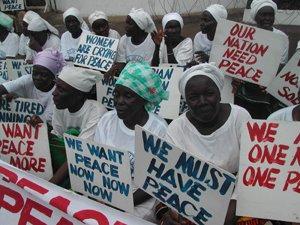Pray The Devil Back To Hell

Imagine all the worst atrocities that can be committed against women. Think of all of the greatest evils that stain a country with corruption and greed. Then, in the direst of situations, imagine how a group of women could change the face of blood and hopelessness. This is the story of Pray the Devil Back to Hell.
Not the devil with a pitchfork, the devil referenced in this film is the evil that we all fear—women and men alike. The darkest of all oppression are the sins committed against innocent children: turning sons into drug addicted child soldiers, the rape of young daughters, and the burning injustice of war. This is the story of Liberia, a country founded by freed slaves in 1847 that erupted into civil war in 1989.
This film focuses primarily on the story told by Leymah Gbowee, a social worker and organizer of the Christian Women’s Initiative, which joined with Muslim women to fight for peace in Liberia after years of hunger, death, and silence. Gbowee explains the misery of an oppressive government led by president Charles Taylor and the unrestrained rebels, the Liberians United for Reconciliation and Democracy (LURD), who only knew violent tactics to overthrow Taylor.
Pray the Devil Back to Hell is like an elevator ride that first descends into the depths of hell itself with footage from the mangled streets and haunting images of young, smiling boys with guns. The accounts of rape and the killing sprees are graphic, sharply and painfully illustrating an almost surreal world of unimaginable terror.
Then the elevator ascends, jaggedly and slowly into the unfolding vision by women—both Christian and Muslim—who first plead, then appeal, and then demand peace. The strength and vibrant spirit of community unify the Liberian women in their praying, organizing, protesting, fasting, marching, and sit-ins. The film points the viewer to all the stages where women’s presence is necessary, from the spreading violence of warlords to the United Nations peacekeeping "experts" who organized the near disastrous disarmament, to the electing of the first women president in Africa.
This film is a succinct seventy-four minute lesson and testament to the fear and power of grassroots organizing and the legacy of a women’s movement birthed in a harrowing era of Liberian history. It is stripped of lofty academic jargon and nothing short of mesmerizing, horrific, and jolting. Pray the Devil Back to Hell is the living conflict of prayer, action, and justice-seeking love of country and brethren.
The importance of this film cannot be overstated. It is a model of what is possible and what should be strived for in times of naked tyranny and oppression. It is the inspiring and empowering story of what can be overcome when women are gathered for common purpose and love.